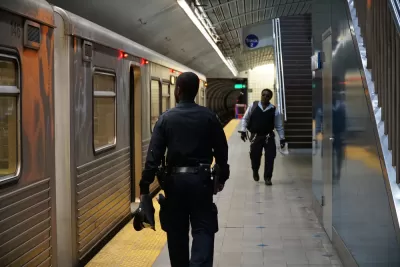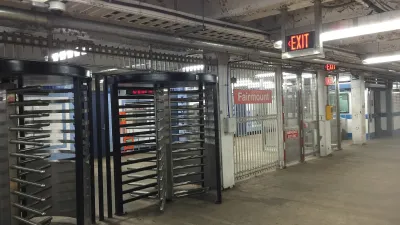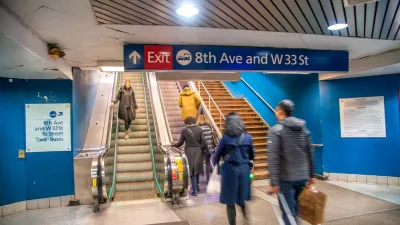Some transit agencies are launching ‘ambassador’ programs that use unarmed personnel to respond to safety concerns and reduce interactions with armed law enforcement.

Advocates have long called for a decrease in armed police presence on public transit, citing research showing that a police presence doesn’t necessarily contribute to a safer environment and discourages ridership. Now, transit agencies are starting to shift their approach when it comes to transit security, writes Henry Pan in Next City.
“Last year, BART Police began to pilot its Transit Ambassadors program, using uniformed but unarmed personnel to respond to riders facing homelessness, mental health emergencies, drug overdoses and other crises.” For now, these ambassadors are still accompanied by police officers, but BART’s Chief Communications Officer Alicia Trost says “The idea is to really reimagine safety and to meet the needs of all types of riders, but especially marginalized communities who are often not listened to, or or often aren’t given resources based on their needs.”
According to Pan, “Deploying ambassadors seems to be working. During the pilot period between February and August of 2020, ambassadors called police to resolve less than 1% of the over 14,000 interactions they have with riders. Reports on sexual harassment, sexual assault and lewd behavior sent by riders through their BART Watch app are also decreasing, from 2% in 2019 to less than 1% so far this year.”
Similarly, “The Massachusetts Bay Transportation Authority has an ambassador program that relies on contractors, with the Los Angeles County Metropolitan Transportation Authority to follow next month. Metro Transit’s Police Department in the Twin Cities created a Homeless Action Team in 2018 that connected over 400 formerly unhoused people who ride the system for shelter to public housing managed by its parent agency, the Metropolitan Council.”
For now, BART plans to stick with police officers alongside the new ambassadors, citing the potential need for an armed response in the event of a major incident.
FULL STORY: Transit Agencies Try Decarceral Approaches to Improve Rider Safety

Trump Administration Could Effectively End Housing Voucher Program
Federal officials are eyeing major cuts to the Section 8 program that helps millions of low-income households pay rent.

Planetizen Federal Action Tracker
A weekly monitor of how Trump’s orders and actions are impacting planners and planning in America.

Ken Jennings Launches Transit Web Series
The Jeopardy champ wants you to ride public transit.

Washington Legislature Passes Rent Increase Cap
A bill that caps rent increases at 7 percent plus inflation is headed to the governor’s desk.

From Planning to Action: How LA County Is Rethinking Climate Resilience
Chief Sustainability Officer Rita Kampalath outlines the County’s shift from planning to implementation in its climate resilience efforts, emphasizing cross-departmental coordination, updated recovery strategies, and the need for flexible funding.

New Mexico Aging Department Commits to Helping Seniors Age ‘In Place’ and ‘Autonomously’ in New Draft Plan
As New Mexico’s population of seniors continues to grow, the state’s aging department is proposing expanded initiatives to help seniors maintain their autonomy while also supporting family caregivers.
Urban Design for Planners 1: Software Tools
This six-course series explores essential urban design concepts using open source software and equips planners with the tools they need to participate fully in the urban design process.
Planning for Universal Design
Learn the tools for implementing Universal Design in planning regulations.
Heyer Gruel & Associates PA
Ada County Highway District
Institute for Housing and Urban Development Studies (IHS)
City of Grandview
Harvard GSD Executive Education
Toledo-Lucas County Plan Commissions
Salt Lake City
NYU Wagner Graduate School of Public Service





























